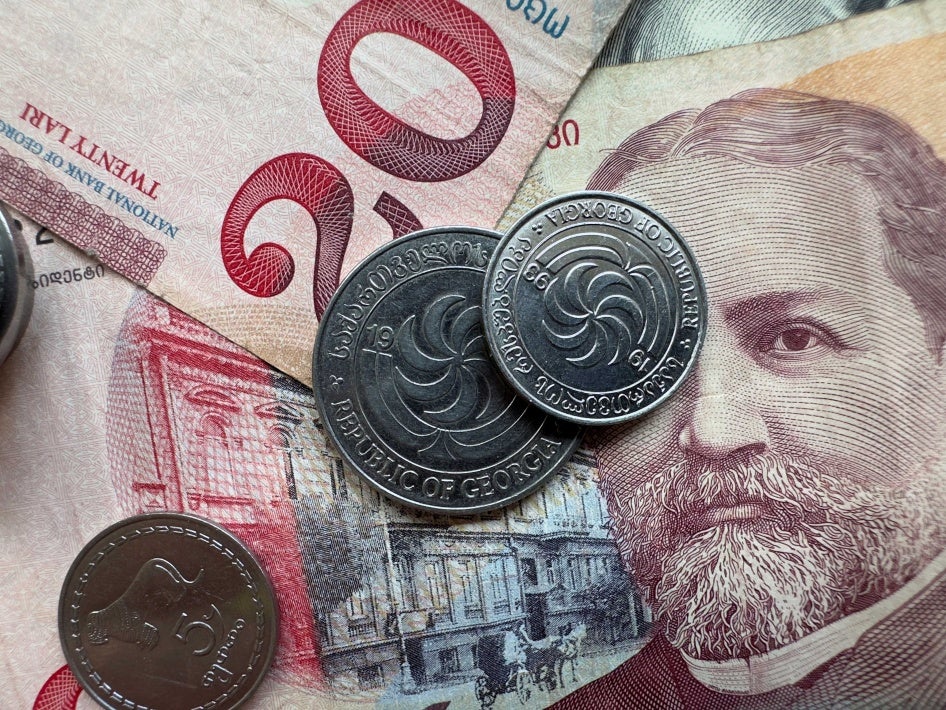Georgia has come a long way since the 1990s, a decade marred by civil war, political instability, and a faltering economy. But there’s one area where the country has, quite literally, remained stuck in that distant past: its minimum wage.
Georgia’s private sector minimum wage was last updated in 1999, and currently stands at ₾20 ($7.50) per month. That makes it one of the lowest monthly minimum wages in the world — about enough to buy a few liters of milk.
Despite broad popular support for raising the minimum wage, successive governments have preferred instead to let the market decide. That is both a cruel abandonment of the state’s duties to its people and a flagrant violation of international human rights law. It is well past time for it to be addressed.
Georgia’s labor practices, including its minimum wage among other social-economic policies, will come under scrutiny in Geneva the week of 4 March. The UN Committee on Economic Social and Cultural Rights will begin the process of reviewing Georgia’s compliance with one of the UN’s most important treaties, the International Covenant on Economic, Social and Cultural Rights (ICESCR).
The Covenant states that everyone has the right to enjoy ‘just and favorable conditions of work’, including ‘fair wages’ that provide ‘a decent living for themselves and their families’. The Committee has interpreted this provision as imposing a duty on states to establish a minimum wage. However, they have also consistently noted that simply having a minimum wage isn’t enough: it must also be indexed to the cost of living, recognized in legislation, and set at a level that provides workers with a ‘decent living’.
At the moment, Georgia satisfies none of these requirements. Its minimum wage was fixed by presidential decree, not legislation, and lacks any mechanism that indexes it to the cost of living. And it goes without saying that it would not provide for a ‘decent living’.
To be fair, it’s unlikely that anyone in Georgia actually earns ₾20 per month. Georgia’s median wage was ₾1,040 ($390) in 2022 and the ‘unofficial’ monthly minimum wage is said to be closer to ₾350 ($130). But unofficial minimum wages can be circumvented, and often are, which harms women workers the most. A 2022 study by the International School of Economics at Tbilisi State University, for example, found that 11.9% of male employees and 24.6% of female employees make less than ₾350 per month. Even more troublingly, 11.7% of women and 5.4% of men make less than ₾250 ($94).
That’s below what the government estimates Georgia’s subsistence minimum to be, the amount needed to purchase enough calories to survive. Eliminating such abusive pay practices is one reason why state regulation of wages is essential. ‘The market’ alone isn’t enough.
Another reason is to ensure that people are paid enough to live in dignity, not merely survive. This is why international law explicitly requires that minimum wages allow for a ‘decent living’.
Human rights law does not prescribe any magic number for what constitutes a ‘decent living’, since both national economic circumstances and perceptions of comfort can vary significantly. Instead, one of the key aspects it focuses on is whether the minimum wage allows people to enjoy rights considered essential under international law: food, health care, water, sanitation, housing, clothing, commuting costs and so on.
This means that Georgia’s subsistence minimum of roughly ₾250 is not an adequate basis for setting the minimum wage. It is based solely on a basket of food items — a deeply flawed one at that — and focuses squarely on physiological survival. A human rights-compliant minimum wage must take into account more than just food.
A better approach — as recently endorsed by the UN special rapporteur on extreme poverty and human rights — is for the government to set the minimum wage based on published ‘living wage’ estimates or to calculate its own living wage. While there are various methods for calculating living wages, most closely track the requirements for a ‘decent living’ that are defined in international human rights law.
Recent living wage estimates for Georgia include: ₾1,272 ($480) per month (2021 estimate by the Solidarity Network, a Georgian labor union); ₾1,706 ($640) per month (2022 estimate by the Wage Indicator Foundation) and ₾2,371 ($890) per month (2021 estimate by the Clean Clothes Campaign, an alliance of nongovernmental groups and garment industry labor unions).
Whatever Georgia ultimately decides, this much is clear: the 1990s are over, and so is the era of a ₾20 minimum wage. The UN Committee should remind Georgia of its obligations and provide a road map on how, in consultation with independent worker’s unions, to set a minimum wage that addresses Georgians’ fundamental human rights and guarantees a decent standard of living.










